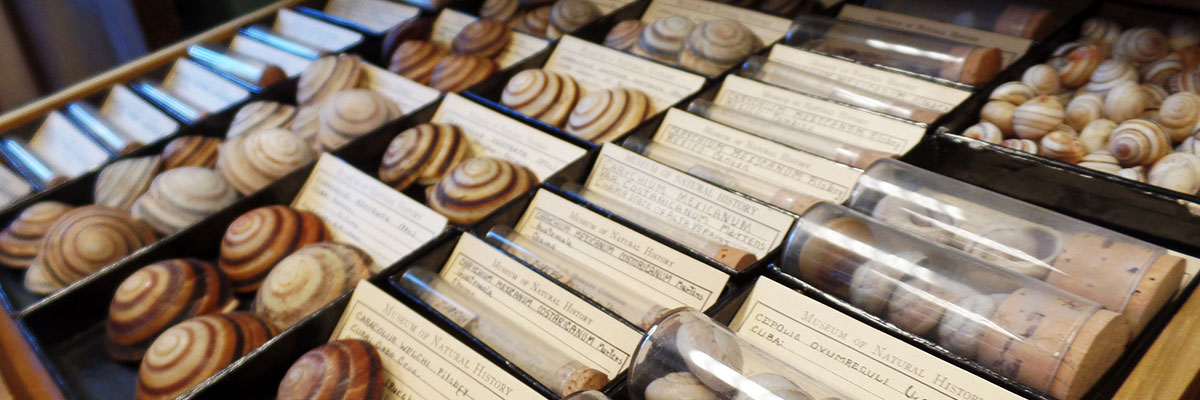Freshwater mollusks such as mussels, clams, and snails are a vital component of stream ecosystems. Not only does their sensitivity to habitat alterations allow them to be biological indicators of stream health, but mollusks— mussels in particular— also provide valuable ecosystem services by continuously filtering water, removing excessive nutrients and pollutants. Mollusks also hold central positions in food webs, consuming algae and being a food source for predators.
INHS researchers map and model mollusk distribution (both past and present), assist with reintroductions and relocations of endangered and threatened mollusk species, document exotic species occurrence, and curate the extensive INHS Mollusk Collection.
Distribution data
INHS scientists are continuously tracking the status and distribution of mollusks in Illinois and beyond through research projects and biological surveys. With the Illinois Department of Natural Resources and Illinois Environmental Protection Agency, INHS scientists have collected baseline mussel community data for each Illinois watershed at long-term monitoring sites. These data are a springboard for additional research, including:
- updates to the status of freshwater mollusks in Illinois, which guides endangered species listings and additions to the Streams Campaign of the Wildlife Action Plan;
- modeling the current and historical distribution of mussels in Illinois, which provides context for where species lived before European settlement and how their distributions have changed; and
- developing restoration criteria for rare mussels in Illinois, which is creating a decision network for optimal management strategies.
Two INHS programs, the Biological Surveys and Assessment Program and Urban Biotic Assessment Program, aid the Illinois Department of Transportation (IDOT) and Illinois State Toll Highway System in complying with environmental laws and regulations; this includes surveying rivers and streams in IDOT and Tollway infrastructure corridors for freshwater mollusks.
The INHS Stream Ecology Lab is modelling freshwater mussel distributions to produce species-specific distribution predictions, identify factors that influence habitat suitability for mussel species and communities, estimate mussel species richness in the study region, and identify regions for mussel conservation efforts.
INHS Stream Ecology Lab scientists are also using historical and contemporary distributions of freshwater mussels, fishes, and aquatic insects in Illinois’ wadeable streams to re-characterize the biological significance of all streams and rivers in the state. These updates will help ensure that Illinois’ aquatic systems and the services they provide are restored from impaired conditions and conserved using well-informed management plans.
Relocation
Since 2005, INHS scientists have translocated thousands of federally endangered Northern Riffleshell (Epioblasma rangiana) and Clubshell (Pleurobema clava) into their historic ranges in Illinois as part of the federal recovery plan. INHS is monitoring their survival and hopes to witness recruitment in the wild. Partners include U.S. Fish and Wildlife Service and state agencies in Pennsylvania and Ohio.
Invasive species
Asian clams (genus Corbicula) are invasive freshwater bivalves that pose a threat to lakes and streams in the United States. For years, the only species known to reside in the Midwest was Corbicula fluminea. In 2008, Corbicula largilllierti began appearing in the navigable rivers in Illinois, and an unknown species appeared in the Illinois River in 2015.
Read more about INHS work on invasive and pest species.

Mollusk collection
The INHS Mollusk Collection is global in scope with over 135 countries represented. The collection contains over 485,000 catalogued specimens and is particularly strong in freshwater mussels, freshwater and terrestrial snails from the midwestern United States, and cone shells. It also has strong holdings of freshwater bivalves and gastropods from the southeastern United States and Central and South America. Data from the mollusk collection can be searched online.
Specimens from the mollusk collection have been used to map historic distributions of mollusk species and chronicle environmental changes in rivers over time.
Resources
MUSSEL Project
The MUSSEL Project (MUSSELp, for short) is an online, open-access, specimen-based database that features taxonomic and geographic range information for freshwater mussel species from around the world. This database, which contains about 30,000 digital images and associated data of mussel specimens, will guide the universal synthesis and revision of freshwater mussel taxonomy.
Species lists and databases
- Freshwater Bivalves of Illinois
- Freshwater Snails of Illinois
- Freshwater Mussel Genera of the World
- Freshwater Mussel Host Database
- Terrestrial Mollusca of Illinois